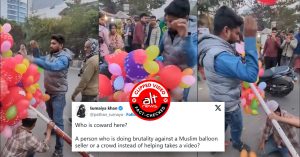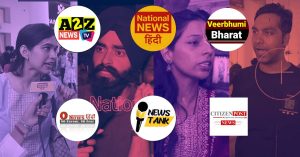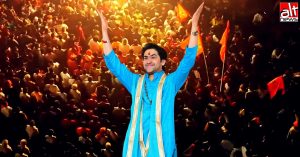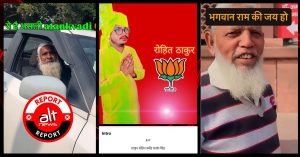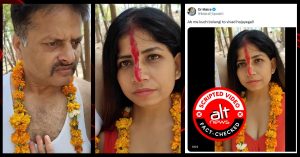“Tum kala kamal likho, hum lal gulaab likhenge…”
[Roughly translated as: You may say the rose is black, we shall keep saying it’s red, tinged in the colour of love.]
Poet Aamir Aziz’s words may have just rung true this Eid.
Even as the Parliament pushed through the contentious Waqf Amendment Bill in the early hours of April 4, visuals of Hindus and Muslims reaching out to each other on Eid exchanging gestures of love and solidarity emerged across the country, offering a heart-warming contrast to the communal otherization that has become the new-normal in India in recent times. In several states, members of the Hindu community showered Namazis with flowers, while some waited outside mosques to greet them with embraces. Elsewhere, Muslims celebrating Eid-ul-Fitr visited local temples carrying messages of brotherhood wrapped in gift boxes.
In Rajasthan, a BJP-led state often marred by divisive politics, businessman Sitaram Gupta’s family in Jaipur continued a fourteen-year-old tradition, visuals of which were shared on social media. In the clip, Gupta, his wife, and the rest of his family can be seen distributing water to Namazis on Eid. In an era where religious festivals are frequently overshadowed by communal tension and violence, the Guptas’ small yet touching gesture won the hearts of millions.
View this post on Instagram
In an exclusive interview with Ummat Times, Gupta and his wife expressed disbelief over how his gestures became one of the most-talked-about things this Eid. “I didn’t know this… I could never have imagined even in my dreams that a day would come when my water-distribution program would be seen by the whole of India.” Speaking about his camaraderie with fellow Muslim businessmen, Gupta says, “Many of them come to our house on Eid with mithai for my kids. We welcome them wholeheartedly, gift them Eidi too.”
Gupta shared that he observed people walk long distances to reach the Eidgah in the heat. “(They) pass by us on foot… we offer them water, and they bless us in return.” When asked if others are involved, he said, “If our peers want to do the same, they’re welcome to. But for us, this is a personal gesture. We’ve never taken donations or financial help for it, and we never will. I fund everything myself… whatever is needed, we contribute willingly and with joy.”
Reflecting on religious festivities often being marred by communal tension, Gupta says, “People should live together in harmony. We must move forward with a spirit of brotherhood. When Hindus and Muslims work side by side, it brings great joy to India. Both festivals deserve equal respect… that’s my heartfelt wish.”
As a final message, Gupta said, “Main toh yeh chahta hoon sab khush rahein. Sab shaant rahein. Mil-jul kar rahein. Aur apna desh taraqqi karein… (To the man who recorded the viral video the video) Aapka bahut bahut shukriya ada karna chahunga ki jo mera message aage tak bhijwaya — iske liye bohot bohot dhanyavaad aapka.” (Translation: I just want everyone to stay happy, peaceful, and united — and for our country to prosper. Thank you so much for sharing my message. I’m truly grateful to you.)
Not far from The Guptas’ locality, in the Pink City itself, saffron-clad Hindu men could be seen showering flowers on Muslims who had come to the Eidgah on Delhi Road to pray. The initiative was reportedly undertaken under the banner of the Hindu-Muslim Unity Committee.
#WATCH | Jaipur, Rajasthan | Under the banner of Hindu Muslim Unity Committee, Hindus showered flowers on the Muslims who came to Eidgah, located at Delhi Road, to celebrate Eid al-Fitr. pic.twitter.com/JsIigQ5yrK
— ANI (@ANI) March 31, 2025
Photojournalist Pallav Paliwal also shared footage of a man donning a saffron attire and showering the worshippers with flowers at Eidgah. “Communal Harmony”, he wrote in his caption.
View this post on Instagram
In riot-stricken Maharashtra, a heartening gesture came from 64-year-old Sharad Kadam. The former Mumbai president of the Rashtriya Sewa Dal, along with four others, reportedly stood outside a mosque in the densely populated area of Chirag Nagar, Ghatkopar — wearing white caps and waiting to greet Namazis with red roses as they emerged from prayer. The group was then invited inside the mosque. Kadam and his compatriots were consequently promised by the Muslim community to take the relationship forward.
नफरतों के बाज़ारमें मोहब्बतों की दुकान।
आज ईद..
मुस्लिम बांधवांना शुभेच्छा देण्याकरिता घाटकोपर मधील पारशी वाडी येथील…Posted by Sharad Kadam on Sunday 30 March 2025
In Uttar Pradesh, Saying it With Flowers
Uttar Pradesh has long been a hotbed of communal tension. Chief minister Yogi Adityanath has gone on record making several communal remarks, specifically targeting Muslims — many of which have been documented by Alt News. However, this Eid, the state witnessed several heartening instances of individuals from the Hindu community reaching out to their Muslim compatriots, expressing solidarity by showering them with flowers.
In Varanasi, several saffron-clad Hindu men were seen showering Muslim worshippers with flowers and embracing them as they exited a mosque. Samajwadi Party leader Mohammad Zubair Khan, who is based out of Varanasi, shared a video of the interaction, describing it as “a true example of Ganga-Jamuni tehzeeb.” Zubair himself is also seen in the video hugging fellow citizens from the Hindu community.
The incident reportedly took place at the Benia Bagh area in Varanasi.
View this post on Instagram
In UP’s Amroha as well, Muslim worshippers were showered with flowers on their way to pray. Among those offering the gesture was a saffron-clad Hindu priest, adorned with a Rudraksha necklace. The clip was shared by journalist Shuaib Raza.
ये खूबसूरत तस्वीरें अमरोहा से, ईद की नाम पढ़ने जा रहे लोगों पर हिंदु समुदाय के लोगों ने फूल बरसाए.#EidMubarak pic.twitter.com/b12doACDs6
— Shuaib Raza | شعیب رضا (@ShoaibRaza87) March 31, 2025
In Prayagraj, where the Maha Kumbh Mela recently concluded, several social organisations gifted roses to the worshippers after they offered prayers at the Eidgah. One Girish Chandra Pandey, who was present in the program, told Dainik Bhaskar that the Muslim community was being presented with flowers, water and vermicelli in honour of fasting for 30 days. Additionally, Dainik Bhaskar reported that the Muslim community also showered Hindu worshippers with flowers during the Maha Kumbh.
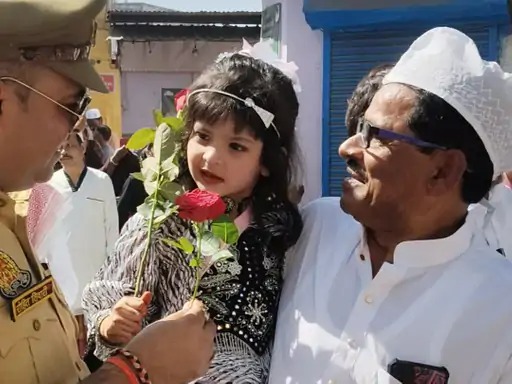
Similar gestures were seen from members of the Muslim community during Holi. In Sambhal, Uttar Pradesh — a region that has witnessed several communal clashes in the past year, particularly over the Jama Masjid dispute that even led to fatalities — Muslims in the Sirsi neighbourhood showered Hindus with flowers in a symbolic act of unity. In Delhi’s Seelampur as well, visuals emerged of Hindus showering their Muslim neighbours with petals — a thoughtful gesture of respect and outreach.
All in all, it was refreshing to witness a shift — individuals donning saffron attires and tilak, symbols that have increasingly become associated with aggressive majoritarianism, making conscious gestures of communal harmony. Notably, all of the incidents documented in this story took place in BJP-ruled states which have frequently witnessed communal tensions, often manifesting as vigilantism, hate speech, or targeted violence.
Temple Visit on Eid in Bengaluru
A similar scene unfolded in Bengaluru, where Muslims stepped up to celebrate Eid by sharing their happiness with Hindu priests in neighbourhood temples.
In an attempt to further communal harmony, Zahoor Ahmed and Mohammed Amer, part of an initiative called Gifting Sunnah where individuals unite for the cause of spreading love by distributing gifts on the day of Eid, went to several temples in the Karnataka Capital to share their joy.
Speaking to Alt News, Ahmed said “There is a lot of communal vitriol being spread. We thought instead of just countering it, we would rather do some positive work which would have more impact. We have been distributing gifts since 2018. We put in our own money and do this. We would gift boxes to municipality workers, traffic police, normal police, people who work at petrol pumps and others who work on Eid and help us. But this year, for the first time, we went to the temples and met with the priests.”
Additionally, he informed us that his compatriots were planning to visit churches and Gurudwaras as well. About the reception they got at the temples, Ahmed told us, “We were very nervous when we first approached them, as it was our first time doing something like this. But when we met the priests, they were very welcoming. They hugged us and shared in the joy. One Swamiji told me that we are all created by the same God and that there was no place for hatred among us. We visited seven temples in a single day, and despite wearing skull caps and kurtas — clear markers of our identity — we didn’t face any issues at all.”
Seen in isolation, such acts of sharing gifts or offering drinking water to fellow citizens should not need to be recorded in news reports. Wordsworth called them “little, nameless, unremembered acts of kindness and of love”. But times are such that these need to be remembered and documented and retold, over and over again; in the hope that the season of darkness will give way to the season of light, making us believe in the spring of hope even in the summer of despair.
Independent journalism that speaks truth to power and is free of corporate and political control is possible only when people start contributing towards the same. Please consider donating towards this endeavour to fight fake news and misinformation.
